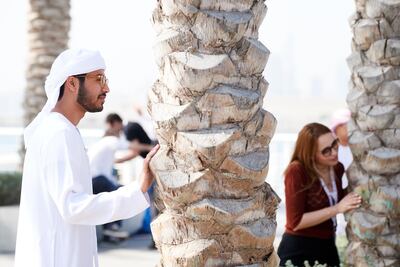A choir of 30 date palms sing in unison as part of Louvre Abu Dhabi's new interactive installation, Singing Trees, which becomes available to the public from Tuesday, February 25. The songs, which include the traditional Emirati Ayyala, play on speakers strapped around each palm. With the use of presence sensors, the volume of these tunes increases when visitors get closer to the trees. The more people interact with the trees at the same time, the more resonant the music will be.
The work aims to call attention to the natural environment and encourages visitors to appreciate it. As the climate crisis deepens and countries face the consequences of policies that have aided environmental destruction, the art world is also trying to find ways to respond. The setting itself is not entirely natural, however, as the work has been installed in the manicured outdoor landscape at the museum's entrance. Visitors can experience Singing Trees for free until Saturday, March 7, after which it will travel to Paris in September.
Partnering with Paris’s Theatre du Chatelet, Louvre Abu Dhabi commissioned design and technology studio Umbrellium from London to create the installation. Known for developing products that tackle urban issues, such as road safety and air quality, Umbrellium has previously worked with cultural institutions such as the Barbican Centre, where they created an immersive environment with light.

Incorporating their ongoing concerns with air quality to Singing Trees, the studio used a programming tool linked to the world air quality index to update the speakers on Abu Dhabi's levels of air pollution. On a hazy day, for example, the audio quality will crackle, while on a clear day, it will play distinctly. Powered by rechargeable batteries, the units communicate with each other wirelessly and are split into groups of bass, alto, soprano and tenor.
In creating Singing Trees, Umbrellium has tried to stay mindful of the environment, using perforated cotton for the exterior design of the speaker covers, and ensuring that the belts that hold them in place do not harm the date palm trees. Though the production of the work, which includes shipping materials and using energy to charge the speakers' batteries, is not sustainable, the studio's chief strategy officer Andrew Caleya Chetty says the installation's main purpose is to send a message. "The role of art for me is one of dialogue and investigation. It gives a different lens to see an issue. We're trying to bring everybody into the conversation… The air quality work we do is about enabling citizens or viewers to understand that they have a role in climate change and a simple action on their part could be like a butterfly beating its wings. It could have a very large ramification," he explains.
Ruth Mackenzie, artistic director of Theatre du Chatelet, agrees. "One of the very important things about art institutions and artists is that they are trusted and people listen to them," she says, adding that it is one way to raise awareness of climate concerns. "The piece is asking… to look what happens if we care about our natural environment. That's a very universal message that often people don't hear in all the flurry of daily news."
The musical pieces for Singing Trees also include traditional folk songs in English and French, specifically Greensleeves from late 16th century England and L'Amour de Moy from Medieval France. The Ayyala song has been recorded by local performers from the capital, and it will travel with the installation when it is presented abroad. The song is part of the traditional Emirati group dance that embodies solidarity and has been included in Unesco's Intangible Cultural Heritage of Humanity list.
The installation also coincides with UAE Innovation Month, a government initiative that seeks to promote the development of new technologies to enhance quality of life in the country. “This project is dedicated to UAE Innovation Month, which the nation is celebrating and which we take part in every year. We decided to present this project because it is a mix of technology, art and environmental awareness. It is particularly important because it is an ongoing exhibition that will tour the world, with the key start here in Abu Dhabi,” says Alia Al Shamsi, acting cultural programming manager at Louvre Abu Dhabi.
“It is a very beautiful way of presenting a dialogue about sustainability. Art has the capability to translate complex issues such as environmental awareness through a simple gesture – approaching a tree – but it shows that the tree has a voice and awareness in it,” she says.
Singing Trees will be at Louvre Abu Dhabi until Saturday, March 7


